“I would fight for the Confederacy today if the circumstances were similar. There’s a great deal of misunderstanding about the Confederacy, the Confederate flag, slavery, the whole thing. The political correctness of today is no way to look at the middle of the nineteenth century.
You have to understand that the raggedy Confederate soldier who owned no slaves and probably couldn’t even read the Constitution, let alone understand it, when he was captured by Union soldiers and asked, ‘What are you fighting for?,’ replied, ‘I’m fighting because you’re down here.’
So I certainly would have fought to keep people from invading my native state.”
~Shelby Foote
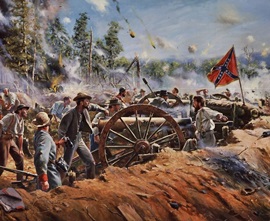
1864 – Union General William T. Sherman launched a major attack on Confederate General Joseph Johnston’s army at the Battle of Kennesaw Mountain in Georgia.
Sherman believed Johnston’s line was stretched thin and that an assault would break the Rebels. Sherman moved against the center of the Confederate lines around Kennesaw Mountain. He feigned attacks on both of Johnston’s flanks, then hurled 8,000 men at the Confederate center. It was a disaster.
Entrenched Southerners bombarded the Yankees, who were attacking uphill. Three thousand Union troops fell, compared with just 500 Confederates.
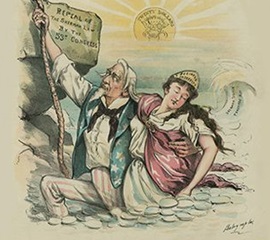
1893 – The New York Stock Exchange crashed.
One of the first clear signs of trouble came on February 20, twelve days before the inauguration of president Grover Cleveland, with the appointment of receivers for the Philadelphia and Reading Railroad, which had greatly overextended itself.
Upon taking office, Cleveland dealt directly with the Treasury crisis and convinced Congress to repeal the Sherman Silver Purchase Act, which he felt was mainly responsible for the economic crisis.
The repeal of this act caused a steep decline in the value of silver and gold. Unemployment spread until one in six American men lost their jobs. Five hundred banks closed, fifteen thousand businesses (including 146 railroads) failed, and numerous farms ceased operation.
The unemployment rate hit 25% in Pennsylvania, 35% in New York, and 43% in Michigan.
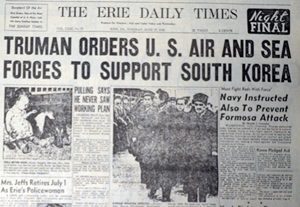
1950 – President Harry Truman ordered the Air Force and Navy into the Korean War following a call from the United Nations Security Council for member nations to help South Korea repel an invasion from the North.
Truman strongly suggested that the USSR was behind the North Korean invasion, and in fact the Soviets had given tacit approval to the invasion, which was carried out with Soviet-made tanks and weapons.
In addition to ordering U.S. forces to Korea, Truman also deployed the U.S. 7th Fleet to Formosa (Taiwan) to guard against invasion by communist China and ordered an acceleration of military aid to French forces fighting communist guerrillas in Vietnam.
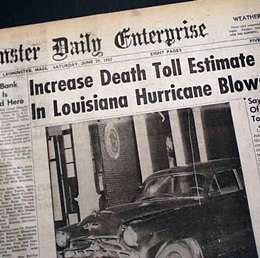
1957 – More than 400 people were killed when Hurricane Audrey slammed through coastal Louisiana and Texas.
The hurricane left $147 million ($1.3 billion today) in damage and at least 416 fatalities in the U.S., most of them in eastern Texas and western Louisiana. As it moved inland, Audrey spawned 23 tornadoes, one as far north as St Albans, VT.
Audrey is ranked as the eighth deadliest hurricane to hit the United States mainland since accurate record-keeping began in 1900, and no hurricane caused as many fatalities in the United States until Hurricane Katrina in 2005.

1972 – The Atari company was founded by Nolan Bushnell and Ted Dabney in Santa Clara, CA.
Atari was a pioneer in arcade games, home video game consoles, and home computers. The company’s products, such as Pong, the first commercially successful video game, helped to establish the video game industry.
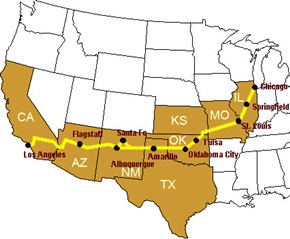
1985 – After 59 years, Route 66 passed into history when the American Association of State Highway and Transportation Officials decertified the road and voted to remove all its highway signs.
Measuring 2,200 miles in its heyday, Route 66 stretched from Chicago, Illinois to Santa Monica, California, passing through eight states.
Route 66 was the scene of a mass westward migration during the 1930s, when more than 200,000 people traveled from the poverty-stricken Dust Bowl to California. John Steinbeck immortalized the highway, which he called the “Mother Road,” in his classic 1939 novel The Grapes of Wrath.
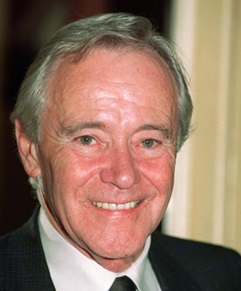
2001 – Two time Academy Award winning actor Jack Lemmon died of bladder cancer at the age of 76.
An eight-time Academy Award nominee, Lemmon starred in over 60 films, including Mister Roberts (for which he won the Academy Award for Best Supporting Actor) and Save the Tiger (for which he won the Academy Award for Best Actor).
His other nominations – for either Best Actor or Best Supporting Actor – were for Some Like It Hot, The Apartment, Days of Wine and Roses, The China Syndrome, Tribute, and Missing.

2002 – John Entwistle, bass guitarist and singer/songwriter with The Who, died from a heart attack induced by a cocaine overdose. He was 57.
Entwistle – the greatest bass player in rock history, in my opinion – was inducted into the Rock and Roll Hall of Fame as a member of the Who in 1990

2005 – Novelist and historian Shelby Foote died at the age of 88 following a heart attack.
Although he had written Fort Sumter to Perryville, Fredericksburg to Meridian and Red River to Appomattox between 1958-1974, Foote was little known to the general public until his appearance in Ken Burns’ PBS documentary The Civil War in 1990, where he introduced a generation of Americans to the war.
The three volumes mentioned above were released as The Civil War: A Narrative (a 2,968-page, 1.2 million-word history of the Civil War), and are an absolute must for any Civil War aficionado. When Burns’ documentary aired in September 1990, Foote appeared in almost 90 segments and was a fan favorite.
As a result, his book sales went through the roof. In one week at the end of September 1990, each volume of the paperback The Civil War: A Narrative sold 1,000 copies per day. By the middle of 1991, Random House had sold 400,000 copies of the trilogy.
I am proud to say I was one of the 400,000.

2009 – Actress and singer Gale Storm, the star of two popular television programs of the 1950s, My Little Margie and The Gale Storm Show, died of natural causes at the age of 87.
Before her television career, Storm had great success as a singer. Her first record, I Hear You Knockin’, sold over a million copies, and Dark Moon reached #4 on the Billboard 100.
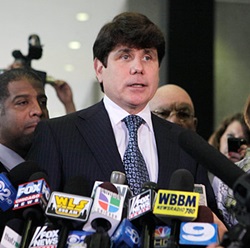
2011 – Former Illinois Gov. Rod Blagojevich was convicted on charges of corruption by a federal jury in Chicago.
Most of the charges related to attempts to “sell” the Senate seat vacated by then-President-elect Barack Obama. He was found guilty of 17 of the 20 charges and later sentenced to 14 years in federal prison.

2015 – Chris Squire, bass guitarist, songwriter, and founder of the progressive rock band Yes, died of acute erythroid leukemia at the age of 67.
He was the longest-serving original member of Yes, having remained in the band until his death and appearing on every studio album released from 1969 to 2014. He was posthumously inducted into the Rock and Roll Hall of Fame as a member of Yes in 2017.
Compiled by Ray Lemire ©2018 RayLemire.com. / Streamingoldies.com. All Rights Reserved.